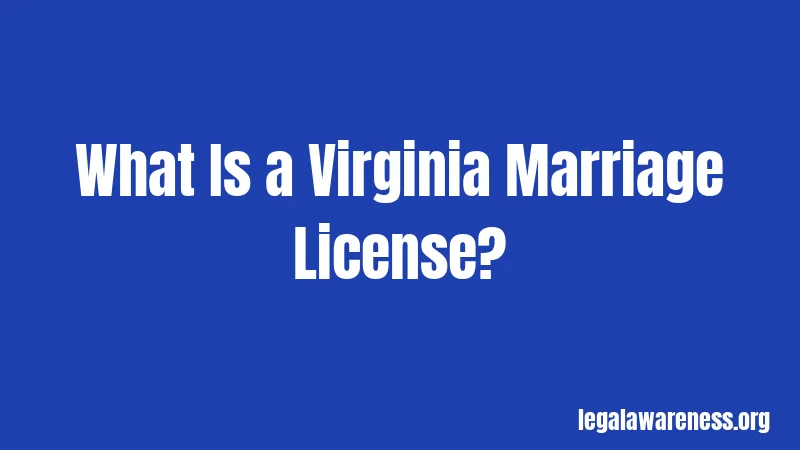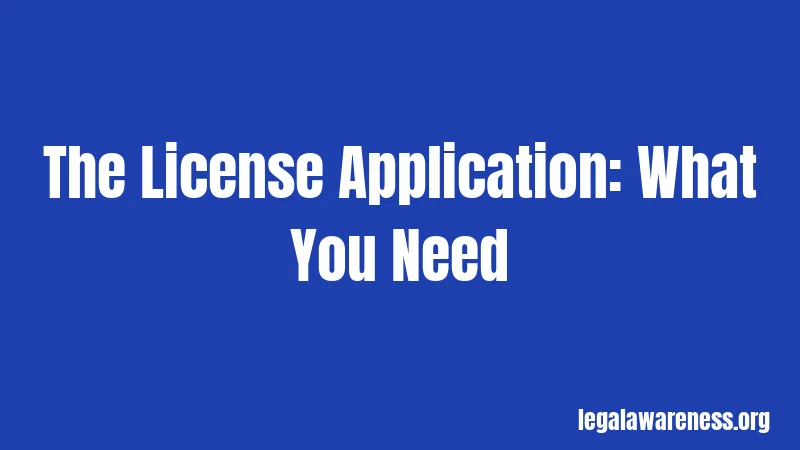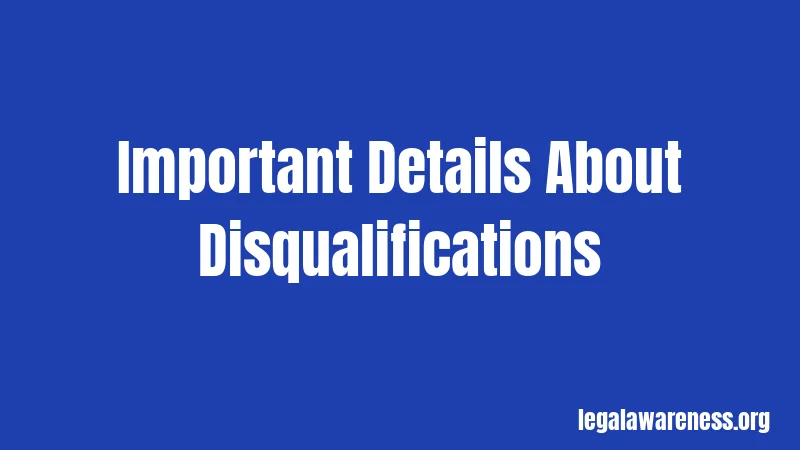Virginia Marriage Laws in 2026: The Complete Honest Guide
You probably think you know the basics about getting married in Virginia. Most people do. But there are actually some surprising rules that catch people off guard—especially when it comes to age requirements, waiting periods, and what paperwork you actually need.
Here’s the thing: Virginia’s marriage laws are pretty straightforward compared to some states, but they’re also strict about certain things. The good news? Once you understand them, you’re golden. Let’s break down exactly what you need to know before you say “I do.”
What Is a Virginia Marriage License?

A Virginia marriage license is an official document that allows you to legally marry in the state. Think of it like a permission slip from the government. Without it, your marriage isn’t legally valid—even if you have a beautiful ceremony with hundreds of witnesses.
The license proves that you and your partner meet Virginia’s requirements. This includes your age, citizenship status, and that you’re actually allowed to get married (no previous marriages still pending, that sort of thing). Pretty straightforward, right?
The Age Requirements: Who Can Get Married
Here’s where Virginia surprises a lot of people. You don’t have to be 18 to get married in Virginia.
If you’re 18 or older, you’re all set. You can get married without anyone’s permission. Easy enough.
But if you’re 16 or 17, you can still get married—you just need parental or judicial consent. One parent needs to sign off on it. Okay… this one’s important, so pay attention here.
If you’re under 16, Virginia doesn’t allow marriage. Period. No exceptions, no special circumstances. You have to wait until you’re at least 16 years old.
The License Application: What You Need

Ready to actually apply for a license? Here’s what comes next.
You’ll need to go to your local circuit court clerk’s office in Virginia. Both you and your partner need to show up in person. You can’t do this online or through a third party—you have to be there.
Bring a valid government-issued ID. We’re talking a driver’s license, passport, military ID, or something official. They’re going to verify who you actually are.
You’ll also need proof of age. Your birth certificate is your best bet here. Not sure what counts as proof? Your ID might work, or you could bring both just to be safe.
If you’ve been married before, you’ll need paperwork showing how your previous marriage ended. This could be a divorce decree, annulment certificate, or death certificate of your former spouse. No mysteries allowed.
The Waiting Period: Here’s Where It Gets Tricky
Okay, pause. Read this carefully. This part confuses a lot of people, and honestly, it’s where most delays happen.
Virginia has a waiting period. After you apply for your license, you have to wait three days before you can actually use it. These are calendar days, not business days. So if you apply on a Friday, you can use the license starting Monday.
But here’s the catch: there’s an exception. If one person is leaving Virginia (like deployed military, moving for a job, that sort of thing), a judge can waive this waiting period. You’d need to go to court and ask the judge. It’s doable, but it requires paperwork and a court appearance.
The license itself is valid for 60 days after you get it. That’s your window to actually get married. After 60 days, it expires and you have to start over.
Important Details About Disqualifications

Not sure if you’re actually allowed to get married? Let me break this down.
You cannot marry your close relatives. We’re talking parents, siblings, grandparents, aunts, uncles—basically anyone in your immediate family. This applies whether they’re related by blood or adoption.
Cousins are actually fine, by the way. First cousins can legally marry in Virginia. Surprised? You’re not alone—most people get this wrong.
If you’re already married to someone else, you can’t marry another person until that marriage legally ends. This seems obvious, but you’d be amazed how many people try anyway.
If you’re getting married to escape a disqualification from a previous marriage, that won’t work either. Virginia has rules against that.
Who Can Perform the Ceremony: Your Options
Sound complicated? It’s actually not. Virginia gives you several options here.
You can have a judge, magistrate, or other court official perform your ceremony. This is probably the most straightforward route. They’re trained, they know what they’re doing, and there’s zero confusion about whether it’s legal.
Virginia also recognizes clergy members and ministers. Any religious official from an established church can perform the ceremony. This is where most traditional weddings happen.
Here’s the interesting part: Virginia also allows what they call “religious societies” to perform marriages. This means if you’re part of a church or religious group that has particular marriage traditions, they might be able to do it.
There’s no “self-marriage” option or anything like that. Someone official has to perform it. The person doing the ceremony needs to sign the marriage license as a witness confirming they actually did it.
The Premarital Counseling Option (Not Required, But Available)
Wait, it gets better. Virginia used to require premarital counseling in some situations. But here’s the deal: that’s not mandatory anymore. The state made it optional.
You can still get premarital counseling if you want to. It’s actually pretty helpful—some couples find it valuable to talk through expectations, finances, family stuff, all of that. But it’s your choice. Nobody’s forcing you.
Common Myths About Virginia Marriage (Cleared Up)
Many people assume common law marriage is a thing in Virginia. Wrong. Virginia does not recognize common law marriage. No matter how long you live together, that doesn’t make you legally married. You need the license and the ceremony.
Another one: people think they need to get married in Virginia if they’re getting married by a Virginia resident. Nope. You can get married anywhere—another state, another country. But if you’re marrying in Virginia, you need a Virginia license.
Some folks believe one person being out of state means you can skip the waiting period. Not true. The waiting period only gets waived by a judge, and they have specific reasons for doing that (military deployment, for example, but not just any travel).
Same-Sex Marriage in Virginia
Okay, let’s talk about this clearly. Virginia recognizes same-sex marriage just like any other marriage. It’s been that way since 2014, when a federal court struck down the state’s marriage restrictions.
You follow the exact same process. Same requirements, same paperwork, same waiting period. No differences. No complications. You’re treated exactly the same as any other couple.
The Marriage License Fee and Costs
Real talk: you’ll need to pay for the license. The fee is usually around $30 to $50, depending on your locality. It’s not huge, but it’s not free either.
Different county clerks might charge slightly different amounts. Most counties sit around $30-$35, but it’s worth calling ahead to confirm. Some offices take cards, some want cash—check when you call.
There’s also the cost of whoever’s performing the ceremony. A judge or magistrate might charge $50 to $100. A religious official might charge less or more, depending on their traditions. And then there’s the cost of the ceremony itself, venue, flowers, all of that.
Just know: the government fee for the license is separate from any other costs you’ll incur.
Changing Your Name After Marriage (What You Need to Know)
This is where a lot of people get stuck, honestly. The marriage license doesn’t automatically change your legal name.
If you want to change your last name—whether you’re the spouse taking the other’s name, both of you changing, hyphenating, or something else—you’ll need to handle that separately. Your marriage certificate gives you the right to do it, but you still have to actually apply for the change.
Most people do a name change through the DMV and Social Security Administration. You’ll need your marriage certificate and some forms. It’s not hard, but it takes time. Don’t assume it’s automatic—get it done quickly so you avoid headaches with your bank, employer, and everyone else.
Out-of-State Marriages: Are They Valid in Virginia?
Got married in another state? Wondering if Virginia recognizes it? Good question.
Virginia recognizes valid marriages from any other state or country—as long as they were legal where they happened. If you got married in New York, California, anywhere—Virginia respects it.
The only exception: Virginia does not recognize marriages that violate its own laws. So if you married someone you’re closely related to in another state (where it might be legal), Virginia won’t recognize that marriage.
Recent Changes to Virginia Marriage Law (2024-2026)
Here’s where it gets interesting. Virginia did update some of its rules recently. The state clarified rules around religious officiants and expanded which groups can perform marriages.
Most of the big stuff—age requirements, waiting periods, license procedures—has stayed the same. But Virginia cleaned up some language and made it clearer who can legally perform marriages.
The waiting period is still three days. The license is still valid for 60 days. Those big rules haven’t budged. But the state did streamline the process for certain situations.
Stay with me here: if you’re planning to get married soon, the current rules are what matter. There’s not a ton of changes coming down the pipeline, so once you understand these rules, you’re basically set.
How to Get Your Marriage License: Step-by-Step
Okay, let’s make this simple. Here’s exactly what you do.
Step 1: Find Your Local Circuit Court Clerk
Locate your county’s circuit court clerk office. Search online for “[your county] Virginia circuit court clerk.” Call them and ask about hours and what you need to bring. Some offices do appointments; others are first-come, first-served.
Step 2: Gather Your Documents
Collect your ID (driver’s license is fine), birth certificate, and any other documents mentioned above. If you’ve been married before, have your divorce decree or death certificate. Don’t show up without these—it’ll just waste your time.
Step 3: Go Together In Person
Both of you need to be there. If one person can’t make it, you can’t complete the application. Mark a date when you can both go. It usually takes 30 minutes to an hour, depending on how busy the office is.
Step 4: Complete the Application
Answer the questions on the form. They’ll ask about your background, whether you’re related, your address, all of that. Be honest. This is official paperwork—lying here is serious.
Step 5: Pay the Fee
Hand over your $30 to $50. Get a receipt. The clerk will tell you exactly when you can use the license (after the three-day wait).
Step 6: Plan Your Ceremony
Once you have the license, contact whoever’s performing your ceremony—judge, minister, whoever. Schedule a time. They’ll need the license on the day of the ceremony.
Step 7: Get Married
Show up, say your vows, have the official sign the license. You’re done. You’re legally married.
What Happens If Your License Expires Without Use
So you got the license 60 days ago and things got complicated? Now what?
If your license expires without being used, you have to start over. You go back to the circuit court clerk and apply for a new one. You’ll pay another fee. You’ll wait another three days.
It’s not the end of the world, but it’s annoying. And it costs more money. So don’t let the deadline sneak up on you.
The moral? Once you have that license, don’t sit on it. Schedule your ceremony within that 60-day window.
Divorcing or Annulling Your Marriage (Quick Overview)
Not happy? Relationships change. Here’s the reality: getting divorced in Virginia is a separate legal process from getting married.
Virginia requires a waiting period for divorce, similar to marriage. It’s usually 6 months if both people agree, or longer if one person contests it.
That’s beyond the scope of this article, but just know: getting unmarried is more complicated than getting married. If you’re thinking about divorce, talk to a family law attorney.
Resources for Getting Help
Still confused? That’s totally normal. Here’s where you can get answers.
Contact your local circuit court clerk directly. They answer questions like this all day. They’re genuinely helpful and won’t judge you for not knowing the rules.
The Virginia Supreme Court has resources on their website about marriage laws. It’s official, it’s free, and it’s clearly written.
If you want legal advice specific to your situation, talk to a family law attorney. They cost money, but they know everything and can protect your interests.
Frequently Asked Questions
Can we get married on the same day we apply for the license?
No. Virginia requires a three-day waiting period. The earliest you can get married is three days after you apply.
Do we need witnesses at our ceremony?
No, Virginia doesn’t require witnesses for the ceremony itself. Only the person performing the marriage needs to sign the license.
What if one of us is not a Virginia resident?
That’s fine. You don’t have to live in Virginia to get married here. Just follow the same process as anyone else.
Can we use an online minister (like Universal Life Church) to marry us?
Technically, Virginia requires the officiant to be part of an established religion or organization. Online ministers are often questionable. Check with your circuit court clerk—they can tell you if your specific minister is acceptable.
What if we want to use our family member as the officiant?
They’d need to be ordained as a minister in an established religion. Just being a family member doesn’t count. Again, ask your clerk—they can clarify what’s acceptable.
If we get married in Virginia but move later, is our marriage still valid?
Yes. Your Virginia marriage is valid everywhere—other states, other countries, everywhere.
Do we need to register our marriage somewhere?
The clerk registers it when you apply for the license. It’s automatically part of Virginia’s vital records. You don’t need to do anything else.
How do we get official copies of our marriage certificate?
Request them from your circuit court clerk’s office. They keep copies on file. You can get certified copies for a small fee. Most people order several because lots of places ask for them.
Final Thoughts
Now you know the basics about getting married in Virginia. It’s really not that complicated once you understand the rules. The three-day waiting period, the 60-day validity, the age requirements, the licensing process—you’ve got this.
Stay informed, stay safe, and when in doubt, call your local circuit court clerk. They’re seriously helpful and used to answering these questions. Honestly, this law makes sense.
References
- Virginia Code § 20-33 (Marriage License Requirements)
- Virginia Code § 20-22 (Age and Consent Requirements)
- Virginia Code § 20-31 (Waiting Period)
- Virginia Supreme Court – Vital Records Information
- Virginia Circuit Court Services Directory
- National Conference of State Legislatures – Marriage Laws Overview
